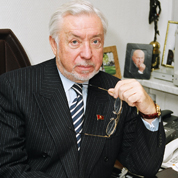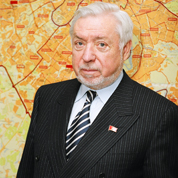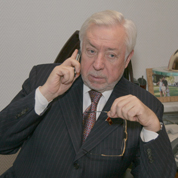MIBA is a cooperation platform for government and businesses

Vladimir Malyshkov — a Moscow City Government Cabinet member and head of the city’s Consumer Market and Services Department, who also doubles as the first vice president of the Moscow International Business Association (MIBA) — recently gave an interview to TRCW, where he talked about MIBA’s activities, the investment climate in the Russian capital and the measures being taken to improve the overall entrepreneurship conditions in the city.
MIBA is an influential organization headed by Moscow Mayor Yuri Luzhkov. As MIBA’s first vice president, how would you define its mission and role in the Moscow economy?
Indeed, MIBA is one of the few organizations in the business community established in 1997, which did not only survive the 1998 default, but also other domestic policies, financial and economic problems over these years. Naturally, MIBA’s tasks changed along with these events. If prior to the default, MIBA’s main goal was to attract Western companies to our markets, the task faced by the MIBA management and personally Mayor Luzhkov, by the end of 1998/beginning of 1999, was how to help member companies survive the post-crisis difficulties. However, MIBA was ready to help foreign companies by the end of 1999, when they started returning to Moscow and Russia and needed reliable partners in the city and other regions. This led to a sharp increase in MIBA membership, which includes both companies working in Moscow and in more than 30 Russian regions. In the course of over ten years of its existence, MIBA’s foreign company members alone have invested about $14bln into production, creation of distribution networks and other business infrastructure in Moscow and Russia, a sum that is approximately 10% of all the accumulated foreign investments in the country. But more important is the fact that MIBA has become a real instrument of cooperation at various governmental levels between different state agencies and business community, in accordance with its motto “Business-Authorities-Direct Dialog.” A unique trait of MIBA is its multi-professionalism, as it brings together both local and foreign, Moscow and regional, large, middle-sized and even small companies, thus representing practically all sections of the Moscow and Russian business communities. The MIBA’s executive committee is made up in equal proportions of the authorities – executive, legislative, federal, regional and municipal - and local and foreign companies, a composition that facilitates the implementation of investment projects, increases the transparency of the authorities’ actions and predictability of businesses’ behaviors.
How would you estimate the investment climate in Moscow today?
Even before the outbreak of the current global financial crisis, we often heard that the investment climate in Moscow had severely worsened. In fact, it is only the conditions that have changed significantly for all players. Firstly, competition has increased significantly. Traditionally, most foreign companies started their ‘conquests’ of Russia from Moscow, where the local regulatory framework is traditionally better, the local authorities’ behavior more predictable and the citizens’ purchasing power is higher. Today, local manufacturers, trade networks, transport and communication companies, processing industry, construction materials businesses, etc. have become strong competitors to foreign companies. This is why we see today that some foreigners are now entering the Russian market from the regions. Secondly, the scope of activities of the main players in Moscow has seriously expanded. For example, in the real-estate industry, several companies, such as the PIK Group are very active. It is now among the five largest developers in Europe following its listing on the London Stock Exchange. Other real-estate development companies such as the Mirax Group, Inteko, SU-155, Glavstroi, etc., are also active, and when necessary, can win any tender by beating companies that have hitherto considered themselves the leaders on the Moscow market. Finally, the Moscow government had to make substantial amendments to the laws regulating the implementation of investment contracts to bring them into harmony with the federal laws. Consequently, a special organ, Moskontrol, has been set up by to oversee the monitoring, control and management of these issues. This affected a lot of investment projects, which were not implemented on time or are not fully implemented in compliance with the laws. This too led to discontent in the business community. This is without mentioning such objective difficulties as the growing tariffs on natural monopolies’ services, which lead to price hikes and inflation, and lack of qualified personnel in all sectors. There are also additional problems with lending activities, which are affecting the banking, construction, trade and food industries, in other words, those who, figuratively speaking, run their businesses on borrowed money. Nevertheless, most Moscow entrepreneurs have come to terms with the new regulations and now demonstrate robust growth in profits that is above the country’s average. For instance, according to VTsIOM’s poll results conducted by the end of 2007, about 15% posted growth rate of 20-40%, while 54% companies said they were satisfied with their activities.
 “A unique trait of MIBA is its multi-professionalism, as it brings together both local and foreign, Moscow and regional, large, middle-sized and even small companies, thus representing practically all sections of the Moscow and Russian business communities.”
“A unique trait of MIBA is its multi-professionalism, as it brings together both local and foreign, Moscow and regional, large, middle-sized and even small companies, thus representing practically all sections of the Moscow and Russian business communities.”
Are you satisfied with the level of investment activity in Moscow today, if yes, why, and if no, what, in your opinion, must be done in order to improve the situation?
The Moscow government and normal companies should not be satisfied with the current situation because it is important to always strive to do better. Today, we are presenting, for the first time, a comparative table of assessments of Moscow’s current business climate by independent experts, foreign and Russian companies (see tab.: Main obstacles to business development in Moscow and Russia). I would like to briefly comment on this table: I will not waste time on the first and second columns as they speak for themselves. Looking at the third column, we can see that if the first two columns reflect problems faced by businesses in their day-to-day activities, the third one contains issues of deeper nature, but, which, in principle, also generate the same problems. In this way, the absence of competition, especially on the local and regional markets, automatically creates additional economic and administrative obstacles, and, consequently, corruption. Infrastructural, financial and staff-related restrictions have long become a stark reality for many companies. These too are indicated in the first two columns and do not require additional comments. As for the third problem, according to experts, over 70% of all companies – irrespective of ownership, both private and state-owned – are non-transparent. This does not only generate corruption, but also prevents companies from efficiently using their available resources and attracting external funding. Therefore, joint efforts are required from both the authorities and companies, to solve these problems as neither party will be able to do so alone.
How do you see the future dynamics of foreign investment activities in Russia, taking into account the increasing anti-Russian rhetoric in the West over the Georgian conflict?
I will try to be brief: I’m looking into the future with optimism. According to the World Bank’s estimates, the U.S. and Western European economies will slow down in 2009, while Russia will demonstrate a 6% increase in GDP growth. Besides, Russians’ disposable incomes will continue to grow, thanks to the government’s prudent policies. This means that our market will continue to grow. Already, Russia is the fourth largest market in Europe, and is expected to become the largest in 2-3 years’ time.
Notwithstanding these positive economic trends, what, in your opinion, are the most significant factors limiting more impressing economic growth in Moscow and Russia in general?
The answer is simple: just look at the table that I have talked about. However, I would like to add one more factor – the insufficient, or to be more exact, lack of operative cooperation between the Moscow and Moscow Regional governments. This a serious limiting factor for Moscow, because active and harmonious development is hardly possible without the coordination and integration of efforts with the Moscow Region, which surrounds the capital.
 “More important is the fact that MIBA has become a real instrument of cooperation at various governmental levels between different state agencies and business community, in accordance with its motto, “Business-Authorities-Direct Dialog.”
“More important is the fact that MIBA has become a real instrument of cooperation at various governmental levels between different state agencies and business community, in accordance with its motto, “Business-Authorities-Direct Dialog.”
Taking into account the negative situation, how do you estimate the dynamics of Russian capital expansion to foreign markets, notably, the Western countries?
MIBA is monitoring the process of Russian capital expansion abroad. And, according to our assessment, about 200-300 transactions are executed annually with the participation of Russian capital in different countries, most of which in the CIS — a objective trend, in our opinion. Introduction of open restrictions against Russian companies is hardly possible in the West, although there have been cases, where tenders for U.S. companies were cancelled after the organizers knew that they were won by Russians. The adoption of stricter laws on foreign investments is at full speed in the West, but it usually raises criticism from U.S. and European investors.
Hypothetically, in the event of a worst case scenario in diplomatic tension between Russia and the West, such as the imposition of sanctions, to what extent, if any, will such policy affect the MIBA members’ interests?
I am sure that even in this hypothetical scenario, it is the West itself that will be most affected. For example, the Russian tobacco market is 90% controlled by four foreign companies, mostly by U.S. firms. Similarly, about 85% of the local beer market is controlled by five foreign companies. Similar figures in the cosmetics industry are four and 60%, confectionery industry four and 50%, etc. So, the question, who will be most affected by sanctions, is, so to speak, a rhetorical one.
Imagine a strategic investor willing to relocate his/her business to Moscow approaches you for advice on how to enter the market. What would be your main recommendations?
Assuming that this investor has already thoroughly investigated the Moscow market and made a fundamental decision to enter our market, I would recommend the following: firstly, to have a reliable Russian partner, this is very important. Secondly, he/she needs to incorporate his/her business properly in full compliance with the local legal requirements. Thirdly, the investor needs to establish good partnership relationship with the local administrations. In all these aspects, the MIBA is always ready to support member companies.
Main obstacles to business development in Moscow and Russia
Ranking Foreign companies’ Assessment Russian companies’ Assessment Experts’ assessment Work of tax authorities Lack of qualified personnel Monopolization of economy sectors Administrative barriers Work of tax authorities Infrastructural, financial and staff-related restrictions Corruption Corruption Non-transparency of companies’ activities
1
2
3
Source: MIBA












 Web design,
Web design,